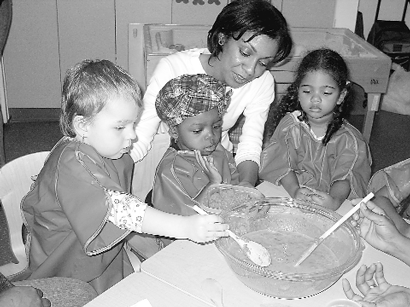By Olga Mantilla
The Borough of Manhattan Community College Early Childhood Center is opening its doors for its 21st year to dozens of little tots of the college’s students this fall. The parents of the preschoolers in the program, generally from low-income backgrounds, are able to attend B.M.C.C. because of the center’s childcare programs. But the positive effects of the center’s programs ripple out
beyond the parent and children participants, participants at the center say, all the way out to the rest of the city.
“One of the reasons I love what I do here is the exciting combined benefit,” said Todd Boressoff, executive director of the Early Childhood Center and Family Child Care Network at B.M.C.C. “Parents go to school and do better than they would otherwise, and children go to school and do better later on than they would otherwise,” he said.
Study after study has proven that high-quality programs for children in their first years of life can produce lifelong benefits. A study on low-income children conducted by the National Institute for Early Education Research shows that children that attend high-quality programs are more likely to be better students in school and more likely to earn more money in their lifetimes than children who never attended a program. The study also finds that the pre-elementary-aged children in childcare centers are less likely to be held back in school, less likely to need remedial help, and less likely to be arrested. Added Boressoff, “We have better citizens, and that’s good for everybody.”
Boressoff, a childcare education and policy activist recently elected to the governing board of the National Association for the Education of Young Children, helped envision and pass the Child Care Access Means Parents in School Program through the U.S. Department of Education in 1998. The law is exemplary of Boressoff’s leading efforts at the center, helping student-parents enroll and remain in college, graduate more quickly, find jobs and earn more in their lifetime.
Rosemary Reyes, a popular head teacher at the center, said B.M.C.C. student-parents know their children are in good hands at the center. “Their children are with professionals,” she said. “They’re safe, and in a high-quality learning environment.”
The teachers at the center are certified by the New York State Education Department and most, like Reyes, hold a master’s degree in early childhood education.
The philosophy at the center stresses the social and academic education of the children through “play,” a principle that Reyes said, “some parents are concerned about in the beginning.” But skeptical parents are won over once they see the mature social skills their children develop at the center.
“Imagine a child who’s never sat in a group,” says Reyes. “They’re not able to sit and listen; if they’d only been at home, they’re lost!”
Of the center’s lack of emphasis on academics, Reyes said, “We don’t have to teach them two plus two — they will learn that. We teach them social skills.”
Kendra Cividanes, a B.M.C.C. student working toward a degree in respiratory therapy, has been dropping off her daughter, now 4 1/2, at the center since enrolling in the college this past spring.
“I always had family members watching my kids,” Cividanes said. So before deciding to join the program, she said, “I kind of investigated — I got familiar with who I would be leaving my kids with. They offered orientations and meetings with the teachers and the director, which made it easier to adjust.”
Cividanes admits she was “kind of discouraged” when she learned that the program did not include an academic curriculum, but had a change of heart when she saw the value in the program’s aims.
“The program will ease her transition into elementary school,” Cividanes said, as her daughters ran back and forth in front of the center’s doors. “Jena learned to make friends. I think it’s important to learn how to socialize in the 2-to-4 [age] bracket.”
Cividanes’s eldest daughter, Jena, will be attending preschool this September — “It’s time to start her academic background,” her mother said. She plans to enroll her 2-year old daughter at the center this fall.
In addition to the center, which serves about 100 children a semester in day and evening programs, B.M.C.C. provides a second program called the Family Child Care Network. F.C.C.N., a program that aids approximately 50 children a semester, is an alternative that serves B.M.C.C. students’ children between 2 months and 12 years of age. The program consists of licensed family childcare homes that offer many of the same advantages as the center, but in a more domestic environment.
The success of B.M.C.C.’s two childcare programs is due in large part to the their caring and involved teachers, and the resources they provide to help both young children and their student parents excel and grow at B.M.C.C.
“I feel like we really make a difference in the parents’ lives,” Reyes said, beaming. “They want to be role models for their kids. They want to graduate and step up in the world. We help make that happen.”
google_ad_client = “pub-6226499064891091”;
google_ad_width = 468;
google_ad_height = 60;
google_ad_format = “468x60_as”;
google_ad_channel =”0606561524″;
google_color_border = “336699”;
google_color_bg = “FFFFFF”;
google_color_link = “0000FF”;
google_color_url = “008000”;
google_color_text = “000000”;
//–>
src=”https://pagead2.googlesyndication.com/pagead/show_ads.js”>
WWW Downtown Express


































